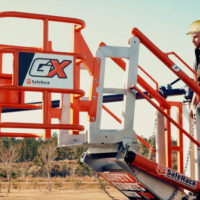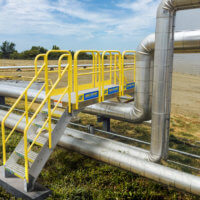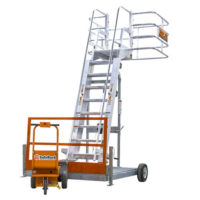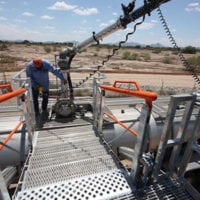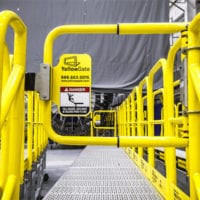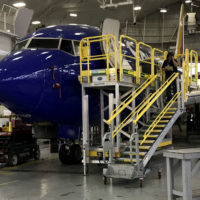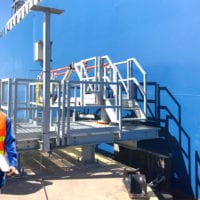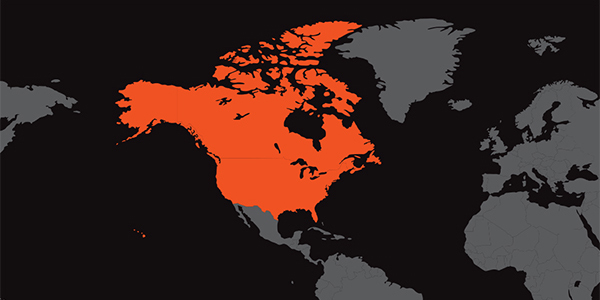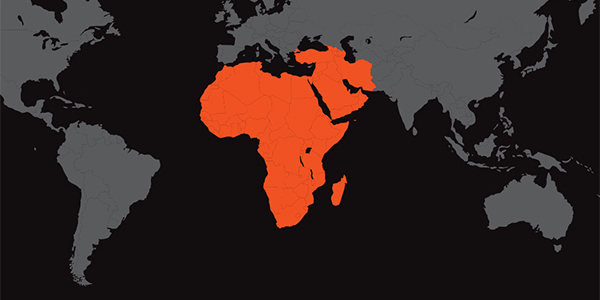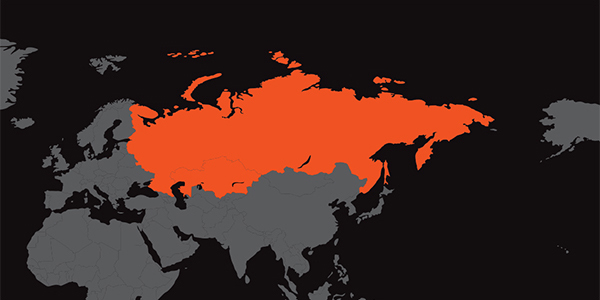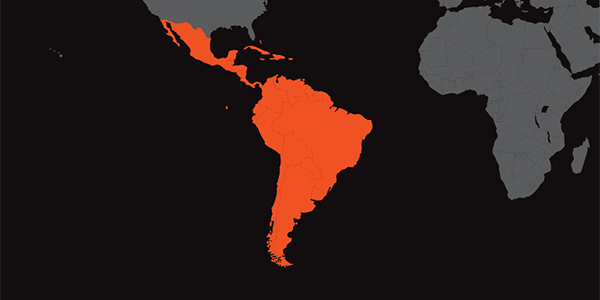Safety has become one of the most important topics across industrial-related careers. Managers and high-level executives have now taken on an increased level of responsibility to ensure that everyone underneath them is following the safety protocols. And they’re educating themselves on how to keep their workplace as safe as possible.
Everyone wants a safe work environment and for jobs that involve handling machines or chemicals, safety precautions are important for environmental and public, and employee safety.
What does this mean for you? Because of the technical complexities involved in safety regulations and protocols, many employees don’t have the time to sit and pore through all the information and updates. Safety regulations vary based on the industry you’re in and the materials you handle. And trying to memorize them can be a challenging mental task that arguably gets in the way of the job itself.
Given the time-consuming and incredibly detailed nature of this task, you can see the opportunity here for a potential career. An abundant number of organizations are desperately seeking safety personnel whose primary job is to keep everyone safe from potential harm where possible.
Industrial Safety Career Paths
You could be the person who negotiates the removal or addition of certain safety rules. You can be the one responsible for enforcing the rules among employees, regardless of their rank, to keep everybody in check with the latest safety equipment and supplies. You could even be the problem-solver who saves the day when something goes wrong and no one knows how to handle the problem in a safe, effective manner.
There are several safety job positions out there, but this article will cover five of the top ones. We chose them because of the potential they have for career growth — not just in terms of the paycheck you receive, but also in terms of promotions, continuous self-improvement, and the number of opportunities available.
#1 – Occupational Health and Safety Technicians Career
Occupational health and safety technicians collect data on the health and safety conditions of the workplace. Technicians work with occupational health and safety specialists in conducting tests and measuring hazards to help prevent harm to workers, property, the environment, and the general public.
 Average Pay: $40–$50K Annually or $23/hour*
Average Pay: $40–$50K Annually or $23/hour*
Most Common Industry: Manufacturing, particularly those specializing in durable goods
Best Cities for Employment: Industry-heavy places like San Jose and Los Angeles, CA
Education Required: High school diploma or equivalent. A majority tend to have a high school diploma or post-secondary degree. Roughly 1/10th have post-graduate degrees
Projected 10-year growth: 9%**
Number of jobs: 15,100**
A safety technician is one of those positions in which current workers may find themselves migrating toward. Either the employee is recommended by a high-level manager, or they take the initiative themselves when the position opens. Because they’ve already been working in the industry, they have the familiarity of the day-to-day work being done in the company.
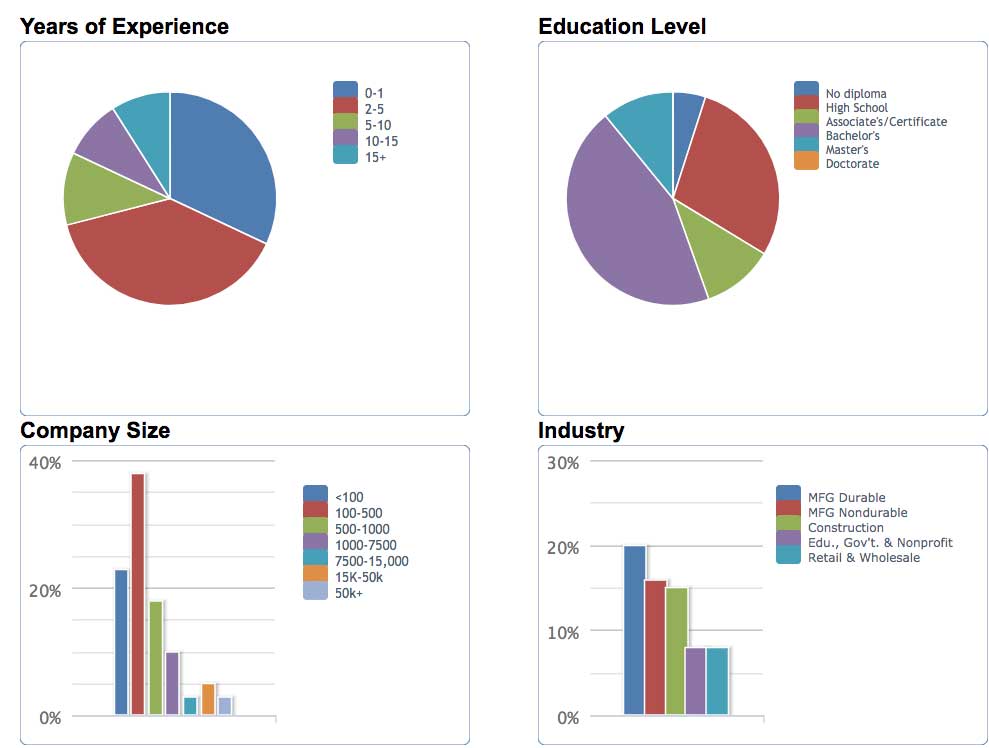
Source: salary.com
Once equipped with the safety regulations at the local, state, and federal levels, safety technicians inspect equipment and working stations to ensure everything is following regulations and is OSHA compliant. The safety technician is then responsible for documenting their safety inspections along with any mishaps, how they were corrected and how they’ll be prevented going forward.
#2: Safety Consulting
 A safety consultant is a more freeform position compared to the other careers mentioned here. Instead of working for a single company for many years, the safety consultant likely spends a lot of time traveling and consulting for various companies. A majority of safety consultants are hired by smaller companies with a total workforce of 500 or fewer employees.
A safety consultant is a more freeform position compared to the other careers mentioned here. Instead of working for a single company for many years, the safety consultant likely spends a lot of time traveling and consulting for various companies. A majority of safety consultants are hired by smaller companies with a total workforce of 500 or fewer employees.
Average Annual Salary: $60–$75K
Most Common Industry: Education, various levels of government. This role isn’t found in the manufacturing industry as often.
Best Cities for Employment: Atlanta and Detroit
Education Required: Bachelor’s degree
Using their education and expertise in the regulatory practices for safety health, this person evaluates worksites, performs safety inspections and advises companies on how they can better train employees to follow safe working practices. This may include additional training, recommending the purchase of new equipment, or outlining plans on how companies can better adhere to safety standards like those laid out by OSHA.
#3: Occupational Health and Safety Specialists Career
 Occupational health and safety specialists analyze many types of work environments and work procedures. Specialists inspect workplaces for adherence to regulations on safety, health, and the environment. They also design programs to prevent disease or injury to workers and damage to the environment.
Occupational health and safety specialists analyze many types of work environments and work procedures. Specialists inspect workplaces for adherence to regulations on safety, health, and the environment. They also design programs to prevent disease or injury to workers and damage to the environment.
Average Pay: $70–$85K Annually or $34/hour*
Most Common Industry: Just like the safety technician, safety specialists are usually seen within the manufacturing goods industries.
Best Cities for Employment: Philadelphia and Washington D.C.
Education Required: Bachelor’s degree for entry-level. Master’s degree in a specific field of interest, or other levels of post-graduate education.
Projected 10-year growth: 4%**
Number of jobs: 70,300**
Safety specialists are extremely specialized within a particular niche of safety along with a specific subset of an industry. You can expect to see them developing or making changes to the policies and procedures of a company with regard to workplace safety.
They spend most of their time within a company doing regular checks of equipment, protocols, and environments to ensure everything is in accordance with health and safety standards.
For example, if your company regularly uses a step-up platform, a safety specialist would go through a comprehensive checklist to ensure this piece of equipment meets all safety standards. Are the dimensions still okay? Is there any sign of damage or wear and tear that needs to be immediately addressed? Does this piece of equipment need to be replaced? Does it still meet the OSHA standards for stair platforms?
This position tends to attract a high number of educated individuals. It’s also common that safety specialists are hired by companies with 5000+ employees.
Falls Lead in Workplace Fatalities
The “Fatal 4” Work Place Fatalities | Developing a fall rescue strategy
#4: Health and Safety Supervisor Careers
 Safety supervisors coordinate and direct a company’s safety initiatives. They help protect workers by developing and implementing procedures designed to reduce workplace injuries. A career as a safety supervisor may begin with enrolling in a bachelor’s degree in an applied psychology program.
Safety supervisors coordinate and direct a company’s safety initiatives. They help protect workers by developing and implementing procedures designed to reduce workplace injuries. A career as a safety supervisor may begin with enrolling in a bachelor’s degree in an applied psychology program.
Average Annual Salary: $83–$90K
Best Cities for Employment: Construction-dominant cities, such as Houston and Indianapolis
Education Required: Bachelor’s degree, at minimum, in addition to many years of work experience (up to a decade)
Most Common Industry: The construction industry
Industries: Aerospace & Defense, Biotechnology, Business Services, Chemicals, Construction, Edu., Gov’t. & Nonprofit, Energy & Utilities, Financial Services, Healthcare, Hospitality & Leisure, Insurance, Media, MFG Durable, MFG Nondurable, Pharmaceuticals, Software & Networking, Telecom, Transportation.
Much like a safety technician, the safety supervisor usually has a background working at the company. With several years of experience to back up their credentials, they have a complete understanding of the day-to-day workplace, including who the employees are as well as their respective responsibilities. The safety supervisor doesn’t spend as much time on-site with other workers. In fact, a good portion of their workday is dealing with administrative activities related to workplace health and safety.
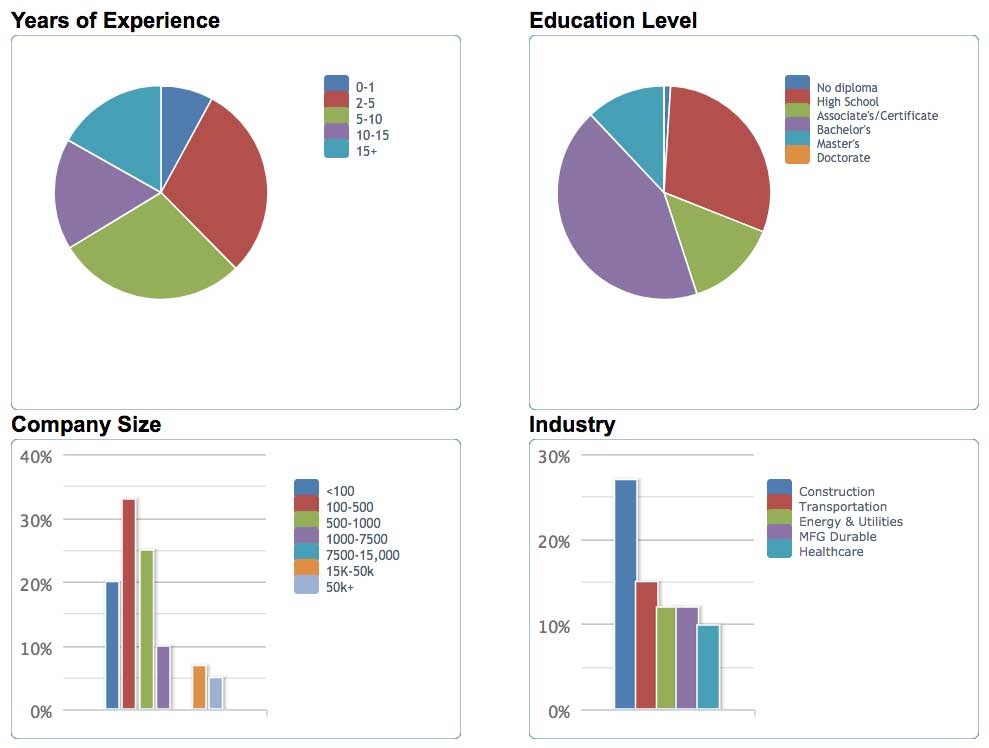 Source: salary.com
Source: salary.com
Typical job duties include regular inspections and monitoring of employee activity to ensure everyone is following the safety procedures and policies dictated by management. These supervisors know what regulating agencies like OSHA require, and they play a crucial role in preventing unnecessary personal injuries and fines from occurring on the work floor.
#5: Safety Director Career
 Safety directors direct, develop, and oversee the general health and safety policies and procedures of the organization. They ensure the workplace is in compliance with OSHA and other states, local, or industry-specific regulations and that periodic safety audits are conducted. They provide programs that ensure a safe workplace including safety orientations, skill training, emergency preparedness, proper job instruction, hazardous material disposal procedures, and the use of protective equipment. Safety directors develop a systemic process to collect data and analyze the causes of accidents and generate required reporting. They implement initiatives to reduce and prevent accidents, occupational illnesses, and exposure to long-term health hazards. This job requires a bachelor’s degree and typically reports to top management. The safety director manages a departmental sub-function within a broader departmental function. However, patients using this anxiolytic to experience emotional satisfaction and euphoria develop addiction much faster (in less than two months).
Safety directors direct, develop, and oversee the general health and safety policies and procedures of the organization. They ensure the workplace is in compliance with OSHA and other states, local, or industry-specific regulations and that periodic safety audits are conducted. They provide programs that ensure a safe workplace including safety orientations, skill training, emergency preparedness, proper job instruction, hazardous material disposal procedures, and the use of protective equipment. Safety directors develop a systemic process to collect data and analyze the causes of accidents and generate required reporting. They implement initiatives to reduce and prevent accidents, occupational illnesses, and exposure to long-term health hazards. This job requires a bachelor’s degree and typically reports to top management. The safety director manages a departmental sub-function within a broader departmental function. However, patients using this anxiolytic to experience emotional satisfaction and euphoria develop addiction much faster (in less than two months).
Average Annual Salary: $95–$125K
Best Cities for Employment: Construction-heavy cities, such as Chicago and Houston
Education Required: Master’s degree or MBA in business or management, related to their specific industry
Most Common Industry: The construction industry
Industries: Aerospace & Defense, Biotechnology, Business Services, Chemicals, Construction, Edu., Gov’t. & Nonprofit, Energy & Utilities, Financial Services, Healthcare, Hospitality & Leisure, Insurance, Internet, Media, MFG Durable, MFG Nondurable, Pharmaceuticals, Retail & Wholesale, Software & Networking, Telecom, Transportation.
The safety director is one of the highest, if not the highest, safety-related roles you can land within a company. This person is responsible for managing the health and safety initiatives across the entire company. They personally oversee the efforts made by all of the workers, and in particular those in the industrial safety positions mentioned here.
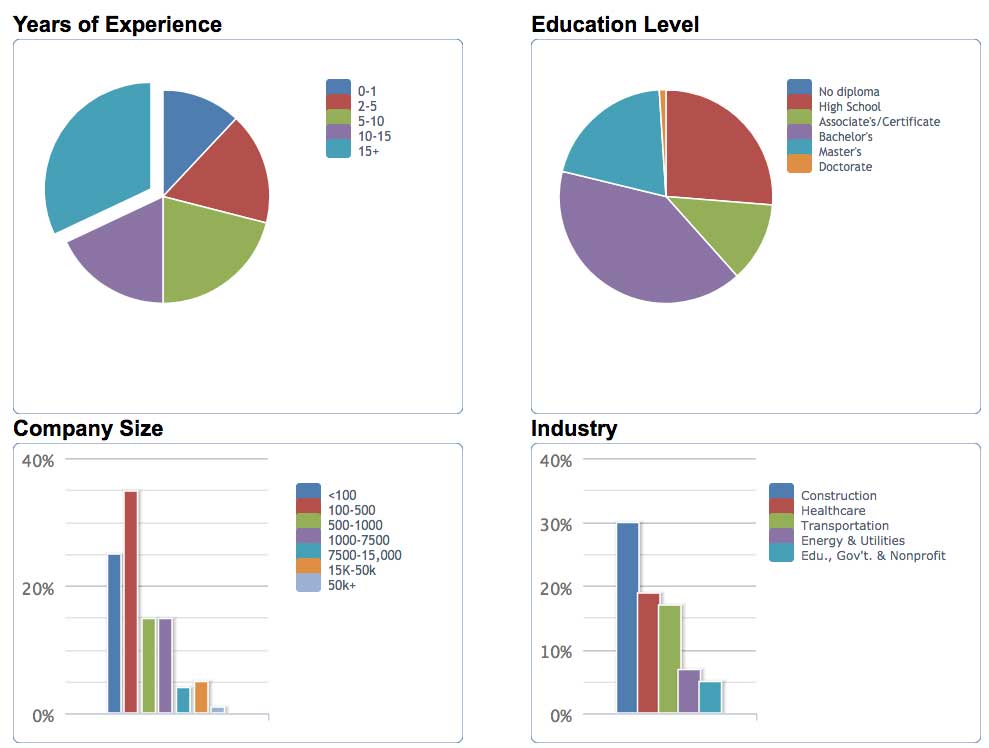
Source: salary.com
In addition to being experts in their chosen industry, they must also involve themselves in regular negotiations and meetings with human resources, managers from other departments, and high-level executives to ensure that everything in the company related to safety is under control. A safety director’s overall goal is to improve safety while simultaneously increasing worker productivity.
Directors tend to be the most educated and experienced individuals out of all the safety careers. They usually have a few decades of experience under their belt before they take on such an important role. These individuals are highly paid, but also hold an incredibly high degree of responsibility. Much like safety supervisors, safety directors tend to aggregate within the construction industry.
*2015 survey
**2014 audit



